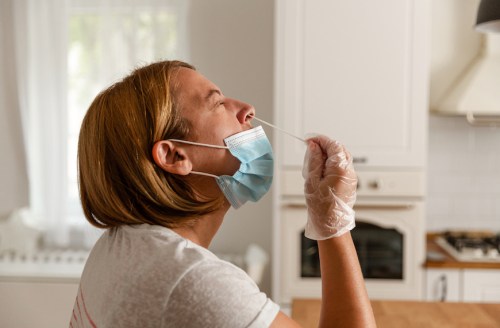What Type of COVID-19 Test Should You Take (and When), According to an Epidemiologist
Figuring out how to navigate possible COVID-19 exposure can feel like a complex math problem: X had coffee with Y on Saturday, and they were indoors, unmasked, and sitting three feet apart. If Y tests positive on Thursday, does X need to test? Which test should X take, and where should X go? It might […]

Figuring out how to navigate possible COVID-19 exposure can feel like a complex math problem: X had coffee with Y on Saturday, and they were indoors, unmasked, and sitting three feet apart. If Y tests positive on Thursday, does X need to test? Which test should X take, and where should X go?
It might sound funny to describe the situation this way, but deducing out what to do next can be stressful. To help demystify testing, timing, and isolation guidelines, we asked two epidemiologists to break down the best practices in various scenarios.
What’s the deal with COVID-19 testing
There isn’t one particular type of COVID-19 test recommended after exposure, and both tests have their strengths and weaknesses. PCR, or polymerase chain reaction, tests are the most definitive test method, says Robert Amler, MD, the dean of School of Health Sciences and Practice at New York Medical College and a former chief medical officer at the Center for Disease Control and Prevention (CDC) Agency for Toxic Substances and Disease Registry, where he specialized in infectious diseases. PCR tests are the most accurate because they can detect much smaller amounts of virus in the body, says Bernadette Boden-Albala, MPH, DrPH, director and founding dean at the University of California, Irvine Program in Public Health. The drawback, however, is that these tests can be costly, and results take several days to come in, so PCR tests might not be your best bet if you’re looking to gather with people outside your household spontaneously.
However, your other option is a rapid antigen test—which you can self-administer or get from a provider. These tests work by detecting specific proteins made by the virus, the U.S. Food and Drug Administration says. They’re also most likely to be accurate when you have symptoms, Dr. Boden-Albala says. “Rapid tests work best when there are more virus particles present in the body (which is also when you are more contagious).” So if you’re looking to figure out whether or not you should visit your parents over the weekend, for example, a rapid test can provide insight on contagiousness.
It’s worth mentioning that antibody tests are also available and can determine exposure, but the FDA says you shouldn’t use them to diagnose active COVID-19 infections. Antibodies can take several days or weeks after an illness to develop, and they also stay in your blood for several weeks or more after recovery. In short: They aren’t the best way to tell if you’re actively fighting COVID-19.
When should you take a COVID-19 test if you’re exposed
While it might be tempting to run out and get tested right after exposure, that’s not necessarily the wisest choice. As we mentioned above, tests, especially rapid tests, are most likely to be accurate when you have symptoms. So if you’ve been exposed and you’re noticing signs of infection, it’s okay to get a COVID-19 test.
“While convenient to obtain over-the-counter and use at home, rapid tests do not detect the same, smaller levels of virus in the system,” Dr. Amler says. This doesn’t mean they aren’t effective. It simply means that asymptomatic people—especially vaccinated and boosted people—and those with very mild symptoms should test five after exposure, even if you’re feeling mostly okay, the CDC says.
Do you need to test again before returning to normal activities
If you’ve followed all the rules and are feeling better, you don’t necessarily need to get retested, Dr. Amler says. “Once the infection runs its course, the PCR test may still detect old non-infectious viral remnants, so testing with PCR later in the illness can be misleading.” What should you do? CDC recommendations have shifted dramatically over the last few weeks. However, if you test positive, the CDC says you can resume work and normal activities if:
- You have completed five days of isolation.
- You wear a tight-fitting mask for five more days and continue social distancing when around other people.
- You haven’t had a fever for 24 hours and you’re not taking fever medication.
- You don’t have COVID-19 symptoms or feel significantly better. (It’s worth noting that loss of taste or smell can linger for weeks or longer, so the persistence of these two symptoms does not prevent you from returning to work or other activities as long as you’ve met the other criteria.
- You continue to reduce the risk to others—especially elderly or immunocompromised people—through continued social distancing, masking, and preference for outdoor activities and events, involving smaller groups of people where possible.
Oh hi! You look like someone who loves free workouts, discounts for cutting-edge wellness brands, and exclusive Well+Good content. Sign up for Well+, our online community of wellness insiders, and unlock your rewards instantly.
Sign Up for Our Daily Newsletter
Get all the latest in wellness, trends, food, fitness, beauty, and more delivered right to your inbox.
Got it, you've been added to our email list.










